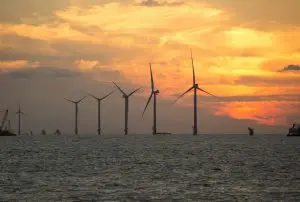As COP26 approaches, Brevia will be tracking the latest milestones in the UK’s preparations for the upcoming climate conference. This week’s developments cover the IEA’s revised global growth forecast for renewables, the COP26 President’s plea to abandon coal, as well as the climate commitments outlined in the Queen’s Speech.
1. Renewables grow at record pace
Annual renewable energy capacity additions increased by close to 50 per cent (45 per cent) to reach nearly 280 GW capacity – the highest growth rate since 1999. The latest Renewable Energy Market Update, published by the International Energy Agency (IEA), revealed a record increase in renewable energy for 2020, with renewables being the only energy source for which demand increased in 2020, despite the impact of the pandemic.[1]
Global wind capacity additions increased by more than 90 per cent in 2020, while solar power grew at a rate twice as fast as in 2020.
Even more encouragingly, the IEA’s Executive Director Faith Birol believes that this ‘exceptionally’ high growth rate will become the ‘new normal’ for 2021 and 2022. The IEA has since revised its forecast for global growth of wind and solar for the coming year up by roughly 25 per cent from the previous growth estimate in November 2020.
Energy industry groups have overall welcomed the Government’s focus on delivering a green economic recovery through its focus on skills and levelling up, but have cautioned on the need for the right policy framework to support a fair and just green transition.[2]
2. ‘Leave coal in the past’
The President Designate of COP26, Alok Sharma MP, delivered a speech this morning from Whitelee Windfarm, where he called on world leaders to abandon coal and bring forward concrete commitments to cut carbon emissions.[3]
The President used his speech to outline the importance of the upcoming climate summit and invoked a personal message from his daughters urging world leaders to “pick the planet.”
Specifically, the former Business Secretary of State singled out the importance of moving away from coal, stating that it was a ‘personal priority’ of his.
The President also reiterated the UK’s priorities for the summit, outlined as: limiting global warming to 1.5 degrees; climate mitigation and adaptation; and securing finance for poorer nations to tackle the impacts of climate change.
His speech also confirmed the UK’s intent to proceed with an in-person event, following mounting questions in recent weeks over the format of the conference, with climate activist Greta Thunberg stating that she does not intend to attend the event in person.[4]
Delivering his speech today, Aloka Sharma stated that further details on the health and safety plans for the conference were to be published in ‘due course’.
A link to the speech can be accessed through here.
3. Queen’s Speech sets out commitment to tackle climate change
On Tuesday 11 May, the Queen formally addressed the State Opening of Parliament, starting a new Parliamentary session. The speech outlined 30 laws that the Government intends to introduce in the upcoming session, including the delayed Environment Bill.[5]
The Environment Bill will now return to Parliament on the 26 May. The Bill has been delayed three times since being introduced to the House of Commons in January 2020. In January 2021, the Government confirmed that it would carry over the Environment Bill to the next Parliamentary session owing to Parliamentary time constraints.[6]
The Bill is viewed as an important piece of legislation for the Government in its preparations for COP26, and is expected to received Royal Assent ahead of the summit. The Bill sets out a framework for legally binding targets on air quality, water waste and biodiversity, and will see the creation of the new independent Office for Environmental Protection.[7]
The Government also announced plans to introduce a Downstream Oil Resilience Bill in draft form to support a secure transition away from fossil fuels to renewables. The legislation is expected to strengthen the UK’s energy supply and prevent supply disruptions from occurring.[8]
BREVIA CONSULTING PROVIDES STRAIGHTFORWARD POLITICAL AND COMMUNICATIONS SUPPORT TO BUSINESSES AND ORGANISATIONS
Discover how Brevia can help you and your organisation by contacting the Brevia Energy Team on 020 7091 1650 or emailing us at: contact@brevia.co.uk
Notes
[1] IEA, ‘Renewable Energy Market Update 2021’, 11 May 2021, Link
[2] RenewableUK, ‘RenewableUK welcomes commitment to green job creation in Queen’s Speech’, 11 May 2021, Link
[3] BEIS, Speech from The Rt Hon Alok Sharma MP, ‘Pick the planet’, 14 May 2021, Link
[4] The Guardian, Agence France-Presse ‘Greta Thunberg says she will not attend Cop26 climate summit’, 9 April 2021, link
[5] Prime Minister’s Office, ‘Queen’s Speech 2021’, 11 May 2021, Link
[6] BBC, Roger Harrabin, ‘Climate: Government postpones Environment Bill again’, 26 January 2021, Link
[7] BBC, Roger Harrabin, ‘How green was the Queen’s Speech?’, 11 May 2021, Link
[8] Department for Business, Energy & Industrial Strategy, ‘BEIS in the Queen’s Speech’, 12 May 2021, Link




